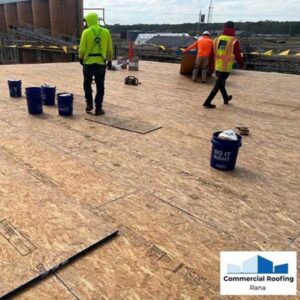
Commercial roofs are essential for protecting buildings from the elements and maintaining a safe and functional working environment. However, even the sturdiest roofs will eventually reach the end of their lifespan and require replacement. Understanding when and why you need to replace your commercial roof is crucial for avoiding costly repairs and ensuring the longevity of your building.
Understanding the Need for Roof Replacement
Commercial roofs withstand a tremendous amount of wear and tear over time. From harsh weather conditions to general wear, various factors can contribute to the deterioration of your roof. Recognizing the signs that indicate the need for roof replacement can save you from serious structural damage and potential safety hazards.
Signs Your Commercial Roof Needs Replacement
1. Leaks and Water Damage: If you notice water stains on the ceiling or walls, it could signal a leak in your roof. Leaks are often an indication that your roof is no longer able to protect your building adequately.
2. Age: Commercial roofs have a limited lifespan. Depending on the material used, the lifespan can range from 20 to 50 years. If your roof is approaching or has exceeded its expected lifespan, it is time to consider replacement.
3. Visible Damage: Cracked, curled, or missing shingles, as well as blistering or peeling paint, are signs that your roof has suffered significant damage and may need replacement.
4. Sagging: A sagging roof indicates serious structural issues. If you notice any bowing or dipping in your roof’s surface, it is crucial to have it replaced immediately.
The Lifespan of Commercial Roofs
The lifespan of a commercial roof depends on various factors, including the type of material used, climate conditions, and maintenance. Here is an overview of the average lifespan for different types of commercial roofs:
– EPDM (Ethylene Propylene Diene Monomer): EPDM roofs typically last around 20 to 30 years. This type of roof is known for its durability and resistance to UV rays and ozone.
– TPO (Thermoplastic Olefin): TPO roofs have an average lifespan of 22 to 30 years. They are highly reflective, energy-efficient, and resistant to chemicals and punctures.
– PVC (Polyvinyl Chloride): PVC roofs can last between 20 to 30 years. They are known for their exceptional durability, resistance to fire, and ability to withstand extreme weather conditions.
– Metal Roofs: Metal roofs are one of the most long-lasting options, with an average lifespan of 40 to 50 years. They are highly resistant to fire, wind, and hail, making them an excellent choice for commercial buildings in areas prone to severe weather.
– Modified Bitumen: Modified bitumen roofs typically last around 20 to 30 years. They are known for their flexibility, making them suitable for buildings with frequent temperature changes.
It is important to note that these are average lifespans, and the actual lifespan of your commercial roof may vary depending on various factors. Regular inspections and maintenance can help extend the lifespan of your roof and ensure its optimal performance.
Choosing the Right Roofing Material
When replacing your commercial roof, selecting the right roofing material is a vital decision that impacts the performance, durability, and energy efficiency of your building. Each roofing material has its advantages and disadvantages, depending on your specific needs and budget.
Pros and Cons of Different Roofing Materials
- Asphalt Shingles: Asphalt shingles are a popular and cost-effective choice. They offer good durability and a wide range of color options. However, they have a relatively shorter lifespan compared to other roofing materials.
- Metal Roofing: Metal roofs are known for their exceptional durability and longevity. They are resistant to fire, wind, and impact damage. However, metal roofing can be more expensive initially.
- TPO Roofing: TPO (Thermoplastic Olefin) roofs are energy-efficient, environmentally friendly, and have a longer lifespan compared to asphalt shingles. However, TPO roofing can be more costly compared to other options.
- EPDM Roofing: EPDM (Ethylene Propylene Diene Monomer) roofs are durable and resistant to UV rays. They are also cost-effective and easy to install. However, they may not be ideal for areas with extreme weather conditions.
Sustainability and Roofing Materials
When choosing a roofing material, it is important to consider its environmental impact. Sustainable roofing options, such as metal and TPO, can help reduce energy consumption, minimize waste, and contribute to a greener building.
The Roof Replacement Process
Replacing a commercial roof involves a series of steps to ensure a successful and efficient project. From the initial inspection to the replacement procedure, each stage plays a crucial role in the long-term performance of your new roof.
Initial Inspection and Assessment
Before starting the roof replacement process, a professional roofing contractor will conduct a thorough inspection of your existing roof. They will assess the condition of the roof, identify any underlying issues, and provide recommendations for the replacement.
Preparing for Roof Replacement
Once the inspection is complete, the next step is to prepare for the roof replacement. This includes obtaining necessary permits, scheduling the replacement timeline, and ensuring the safety and accessibility of the work area.
The Replacement Procedure
The actual replacement procedure involves several stages, including removing the old roofing materials, repairing any underlying damage, installing new insulation if necessary, and finally, installing the new roofing material. Throughout the process, it is crucial to maintain a clean and safe work environment.
Cost Factors in Roof Replacement
The cost of commercial roof replacement depends on various factors. Understanding these factors can help you budget accordingly and make informed decisions about your roof replacement project.
Material Costs
The type and quality of roofing material significantly impact the overall cost of the replacement. Higher-quality materials may have a higher upfront cost but can provide long-term benefits in terms of durability and energy efficiency.
Labor Costs
The cost of labor includes all the expenses associated with the installation, including the wages of the roofing crew and other professionals involved. Labor costs can vary based on the complexity of the project and the expertise of the roofing contractor.
Additional Costs to Consider
There are additional costs to consider when planning for a commercial roof replacement project. These may include permits, waste disposal fees, equipment rentals, and any necessary repairs to the underlying structure.
Maintenance Tips Post-Replacement
After the successful replacement of your commercial roof, proper maintenance is essential for maximizing its lifespan and performance. Regular inspections and preventive measures can help identify and address potential issues before they escalate.
Regular Inspections
Schedule regular inspections with a professional roofing contractor to assess the condition of your new roof. Inspections can help identify any early signs of damage, leakage points, or areas that may require maintenance.
Preventive Measures and Repairs
Take preventive measures to protect your roof from potential damage. Clear debris regularly, ensure proper drainage, and address any minor repairs promptly to avoid larger issues down the line.
By understanding the signs for commercial roof replacement, choosing the right roofing material, following proper replacement procedures, and implementing effective maintenance strategies, you can ensure the longevity and reliability of your commercial roof. Investing in a well-maintained roof is crucial for the safety and success of your business.
Don’t let a worn-out roof put your business at risk. Trust Commercial Roofing Rana to provide you with a Duro-Last roofing system that offers unparalleled protection for your commercial property. Serving the Mid-South since 1983, our team of licensed professionals is dedicated to delivering top-notch roofing services to a wide range of commercial clients, from industrial buildings to shopping centers. Ensure your building’s safety and avoid costly damage with our expertly crafted roofing solutions. Ready to safeguard your property against the elements? Schedule Now! and experience the peace of mind that comes with a superior roofing system from Commercial Roofing Rana.
